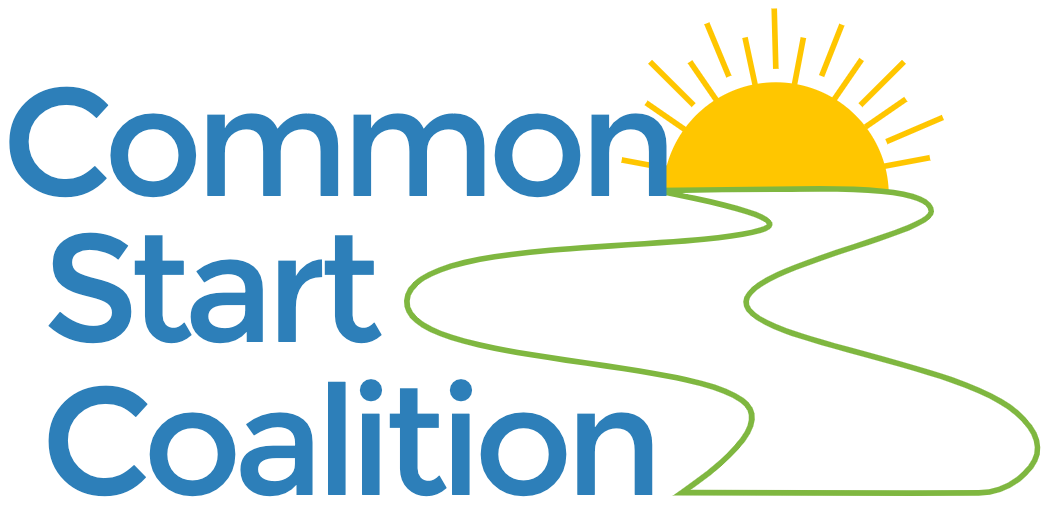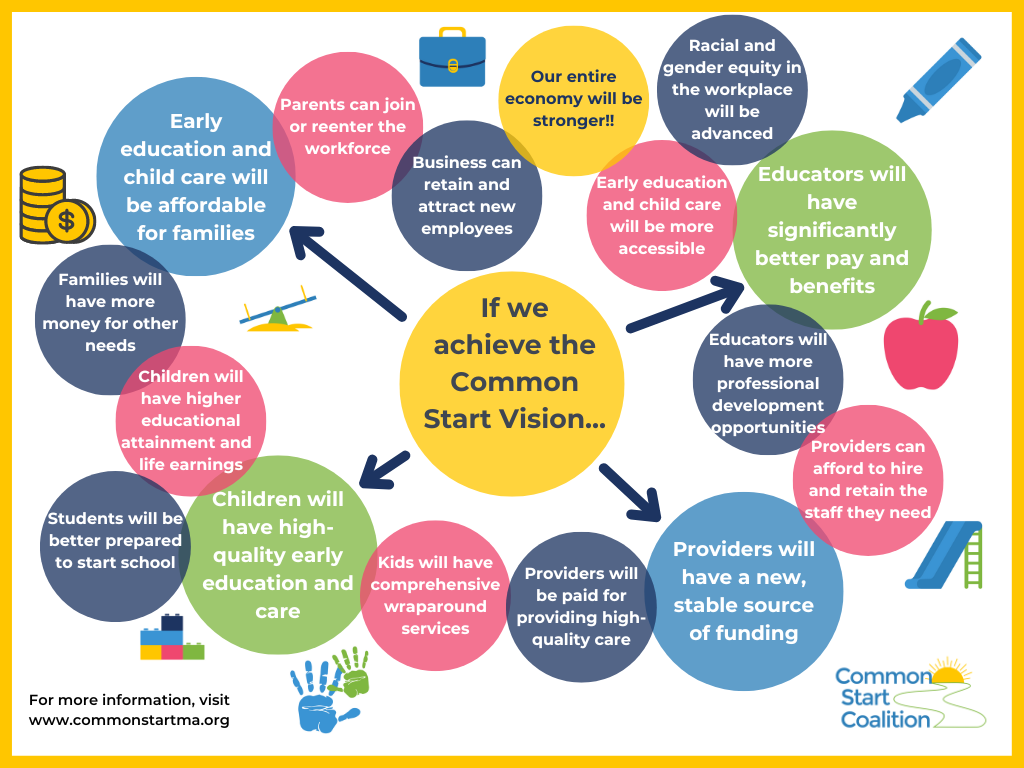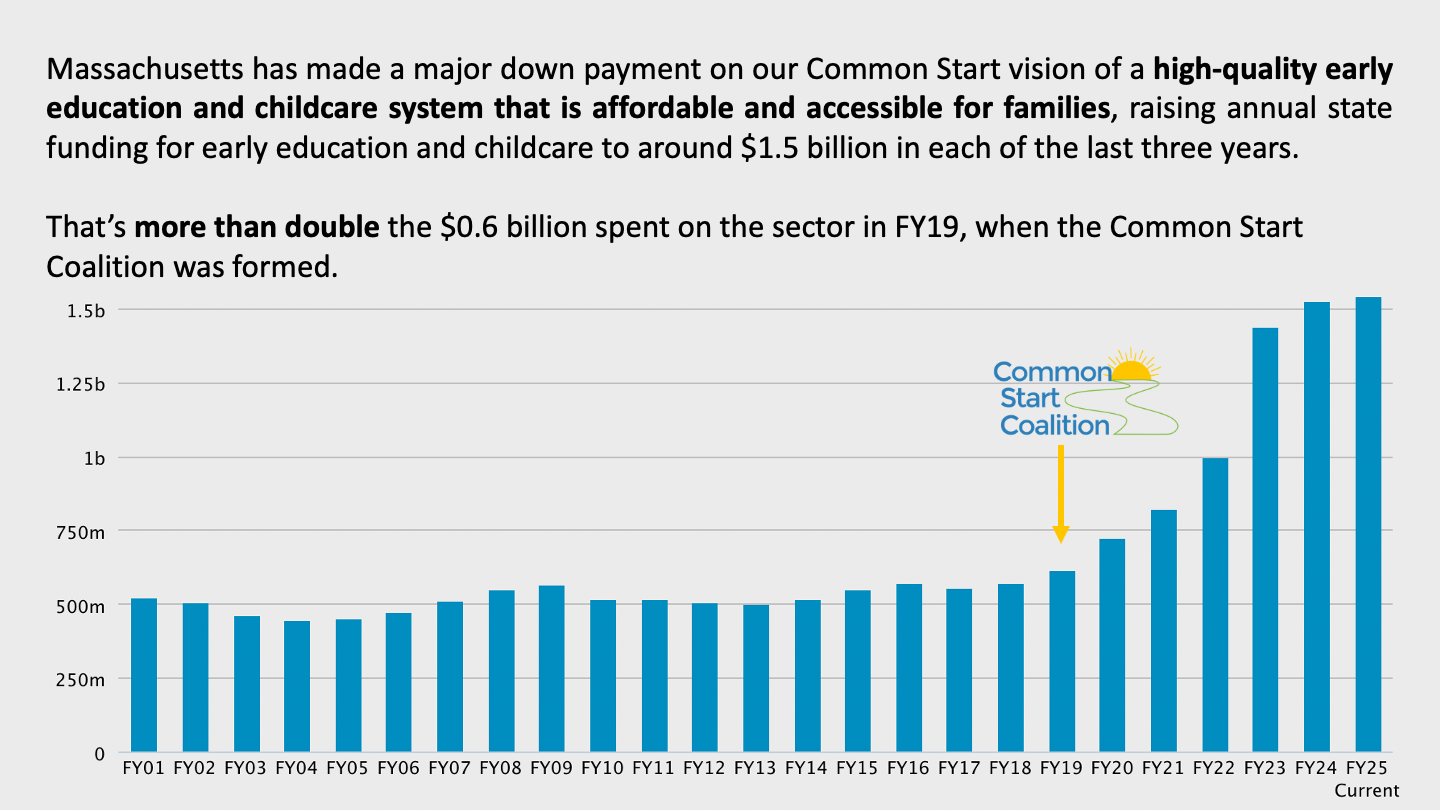
The Common Start Plan
MA Families Need Affordable, High-Quality Early Education and Child Care
In order to provide children with an equal start in life, strengthen our economy in a way that also reduces racial, gender, and income inequality in our state, and meet the needs of working parents and the 21st century workforce; Massachusetts families need affordable, accessible, high-quality early education and child care.
Since 2018, the Common Start Coalition has been steadily building our broad-based coalition to advocate for just that – what we call the Common Start vision. We’ve made enormous strides in raising awareness of the need for action to address Massachusetts’ multifaceted child care challenges, and successfully passed major elements of the Common Start vision into law.
Massachusetts has stabilized our child care system after years of crisis, but much more still needs to be done to address our state’s multifaceted child care challenges. Even with the progress we’ve made, most Massachusetts families with young children still struggle to keep up with the high cost of child care, and tens of thousands of parents – mostly women – are unable to fully participate in the workforce as a result. At the same time, many child care providers find it difficult to keep their classrooms fully staffed. While pay for early educators has increased in recent years, educators still need stable, higher wages and benefits so that they can afford to work in the field they love. And employers across the state are struggling due to their employees’ difficulties finding child care.
Failure to address these issues now will take its toll on the next generation: when denied access to high-quality early education and child care, vulnerable children miss out on the learning environments, structure, and stability that help set them up for education success, optimal earnings, and long-term health and wellbeing. Ensuring that all children have access to high quality early education and care is how we prevent achievement gaps from widening and health disparities from worsening. The Common Start vision will make our state more affordable for families, improve our state’s economic competitiveness, and increase racial and gender equity in our communities.
Access to affordable, high-quality early education and child care is critical to building a stronger, more equal and just Massachusetts. The Common Start Coalition is committed to making this vision a reality.
Advancing Our Common Start Agenda
As a coalition, we developed a comprehensive legislative framework that would provides the specific structure that is needed to deliver affordable care options for families; significantly better pay and benefits for early educators; a new, stable source of funding for providers; high-quality programs and services for children; and substantial relief for businesses and our economy. The Common Start legislative framework uses a combination of direct-to-provider operational funding and family financial assistance to reduce costs to families while compensating providers for the true cost of providing quality care.
Over the last few years, we won widespread legislative support for our framework, our vision was reflected in a major report written by the state’s Early Education and Care Economic Review Commission, and we successfully passed major elements of our Common Start vision into law!
As a result, Massachusetts now has 15,000 more licensed child care spots than there were pre-pandemic, and we are the only state in the nation to maintain operational funding for childcare providers at the same level that the federal government did during the COVID-19 crisis.
Comprehensive child care legislation that was attached to the state budget in 2024 made permanent policy changes that represent a major step towards our Common Start vision, including funding to expand expand eligibility for child care subsidies to some families making up to 85% of state median income ($123,667 for a family of 4, or $84,092 for a family of 2).
Fulfilling our full vision will now require a sustained effort to fund this framework and build on it over the course of several years. That’s why we’re working to:
Reduce the child care financial assistance waitlist and ensure that more families can get help paying for child care
Monitor the implementation of last year’s legislation to ensure that the elements of the Common Start Vision we won are implemented equitably and align with our values
Fight for and explore different ways to fund the full Common Start Vision
What Does This Mean For…
Families:
Financial assistance to the majority of families to significantly lower the cost of care
Enhanced earning opportunities, financial security, and long-term wellbeing
Children:
Participation in high-quality early education and care programs
Greater access to wraparound services
Increased education attainment and life-time earnings and longer-term health benefits, including improvements to children’s brain development
Providers:
Increased public investments in providers to help meet true cost of providing high-quality care
Direct-to-provider operational funding provides stable source of funding and promotes delivery of higher quality care
Educators:
Higher salaries and expanded professional development opportunities
Support for higher credential/degree attainment
Businesses:
Critical support to labor pool
Benefits talent recruitment, retention, and productivity
Under our legislative framework, early education and child care programs will continue to be available in early education and child care centers, private homes, and schools. Our proposals affect early education and care for children from birth through age 5, as well as after- and out-of-school time for children ages 5-12, and for children with special needs through age 15 – in line with the ages covered by the current child care subsidy system.

Get Involved
Massachusetts families need affordable, high-quality early education and child care now! If you're a parent, an early educator, a provider, an employer, or an advocate — we need your voice. Sign up here to join our movement!
Learn more about the Common Start legislative plan with the resources below.
Resources from the 2023-2024 Legislative Session
View a fact sheet on the Common Start 2023-2024 agenda (view in Spanish or Portuguese)
View a fact sheet on H.489 (Reps. Madaro & Gordon) (view in Spanish, Brazilian Portuguese, or European Portuguese)
View a fact sheet on S.301 (Sens. Lewis & Moran) (view in Spanish, Brazilian Portuguese, or European Portuguese)
Track the progress of H.489, see the bill’s co-sponsors, and read the full bill text
Track the progress of S.301, see the bill’s co-sponsors, and read the full bill text
View an infographic about the Common Start vision (view in Spanish)
View a guide to writing a letter to the editor about the Common Start vision
See a list of Common Start coalition members
If you have additional questions about the Common Start legislation, please contact info@commonstartma.org
Resources from the 2021-2022 Legislative Session
View a fact sheet recapping Common Start’s work during the 2021-2022 legislative session
View a fact sheet on H.4795/S.2883 and the Common Start agenda
View a Spanish-language fact sheet on H.4795/S.2883 and the Common Start agenda
View a Portuguese-language fact sheet on H.4795/S.2883 and the Common Start agenda
View a detailed fact sheet on H.4795/S.2883 and how it compares to the original Common Start bill
View a fact sheet on the original Common Start bill (view a fact sheet in Spanish)
View the full text of the original Common Start bill
View a summary overview of the original Common Start bill
View a legal section-by-section summary of the original Common Start bill
View a general list of Frequently Asked Questions (FAQs) about the original Common Start bill
View a short list of FAQs for early education and child care providers
View a detailed list of FAQs for early education and child care providers


